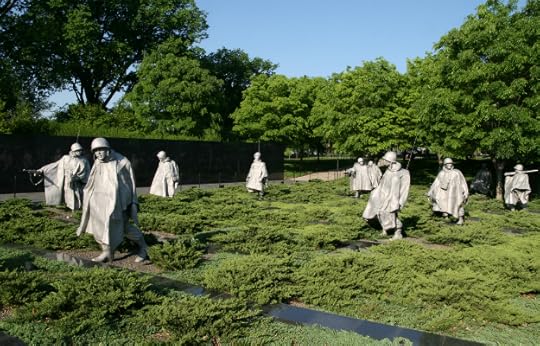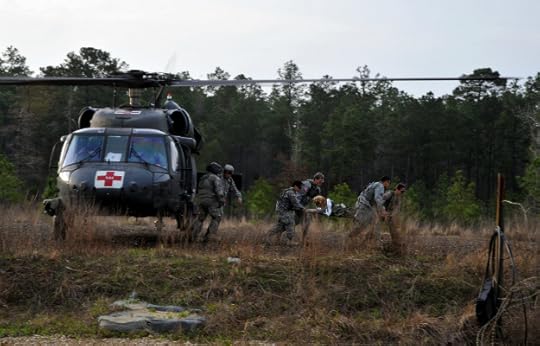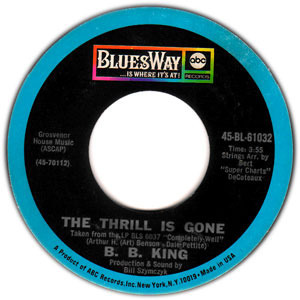Thomas E. Ricks's Blog, page 111
April 30, 2013
Speaking of accountability, how about some of it for the Leatherneck attack?

By Nick
Francona
Best Defense
guest columnist
After reading Rajiv Chandrasekaran's article
about the Sept 14, 2012, attack on Camp Bastion/Leatherneck, I wanted to
respond to comments made by Maj. Gen. Gurganus.
There is an apparent attitude that this attack
occurred because of a failure of British and Tongan troops to secure their side
of the perimeter near the Bastion airfield. It may well be true that Tongan
troops would sleep on post, however, this does not excuse Marine commanders
from inspecting and enforcing rigid standards. Force protection is the
responsibility of the commander and because Maj. Gen. Gurganus had hundreds of
troops stationed on the Bastion side of the base, he is responsible for
overseeing a solid plan to protect his Marines and his aircraft. It is
unacceptable and beneath a Marine general to chalk this up to a Tongan
failure.
I have spent time at Leatherneck and Bastion as
a transient, on the way in and out of parts of rural Helmand. It was obvious to
even a casual observer that many of the posts were unmanned and were comically
left with a "green Ivan" silhouette target as a half-hearted attempt
at deterrence. The fact that there was dead-space around the largest U.S.
military installation in the province is a fundamental failure and simply
unacceptable. Additionally, it was widely known that there were issues with
undocumented TCNs (third-country nationals) on the base that represented a
major counterintelligence challenge. It was naive to think that the enemy would
be unaware of the existence of unmanned towers.
From the article:
"You
can't defend everywhere every day," Gurganus said in response to a question
about the attack. "You base your security on the threat you've got." He said
the Taliban caught "a lucky break."
"When you're fighting a war, the enemy gets a
vote," he said.
While it is indeed impossible to mitigate all
risks, even on large bases, I vehemently disagree with Maj. Gen. Gurganus'
assertion that you can't defend everywhere every day in this context. It is
indeed understandable to have VBIED and suicide bomber incidents at entry
control points (ECPs) of bases, but it is another story entirely to have a
dismounted assault penetrate your perimeter and stroll onto your airfield. His
claim that you base your security on the threat you've got is the root cause
for the environment of complacency that enabled this tragic event to occur. His
statement about the enemy getting a vote is absurd in this context. Indeed the
enemy does get a vote, but so do you, especially when it comes to defending
nearly all Marine aviation assets in the region and a large concentration of personnel.
Precisely because the enemy gets a vote, he has an obligation to anticipate and
counter the enemy, and act like it is a war zone and actively defend his men
and assets. The enemy's "vote" is not akin to a hall pass to stroll
onto the base.
The most offensive of his statements is coining
the attack a lucky break. The attack only occurred because of an egregious
failure in basic infantry practices. The enemy may have been lucky to exploit
these failures, but neglect was the precondition that set the stages for this
attack. Intelligence analysts should not have to issue a warning of an
impending frontal assault on a major military base for the base to be
prepared.
There is an appalling lack of accountability and
introspection that is evident in Maj. Gen. Gurganus' comments about this
incident. It is painfully obvious that this attack would not have been
successful, or likely even attempted, if not for multiple security failures at
Leatherneck/Bastion. This single episode highlights a much larger problem of
accountability in the Marine Corps. It is nearly impossible to get fired for
incompetence.
We need to stop treating the Marine Corps like
a teachers union and demand excellence and accountability from our officer
corps.
Nick Francona is a
former Marine Corps Ground Intelligence Officer with 3rd Battalion, 4th Marines
in Twenty Nine Palms, CA. He served as a Scout
Sniper Platoon Commander in Helmand Province in 2011.
Is the Marine Corps standard for reliefs of colonels different from that for generals?

A
friend writes that he "smells a rat" in the recent relief of the commander of
the Marine Officer Candidate School at Quantico, Virginia.
"You are responsible for what goes on inside your
unit," the Marine commandant said in explaining the removal of Col. Stillings.
"Period."
Oh? wonders my friend.
If that is the standard, he notes, it begs the question of why there has not
been a Marine general relieved in many moons. On General Amos' watch as
commandant, he observes, "the Marine Corps has seen Marines
urinating on Taliban bodies, scout snipers posing with an SS flag, a sexual
assault pandemic that the Commandant himself has described as ‘incompatible with our core values of honor, courage and commitment,'
rising suicide rates, the catastrophic Camp Bastion attack, and
the hazing-cum-suicide of Lance Corporal Harry Lew." So, he asks, "If 2.5 bad
happenings were enough to soul-crush Colonel Stillings, what is the magic
number which would cause a service chief to resign?"
Questions on the Korean War memorial

On
Saturday I dropped by the Korean War Veterans Memorial. (No, I didn't see Justice Breyer
fracture
his shoulder.) I hadn't been there before. I kind of liked it. It is
hyper-realistic, a real contrast to the Vietnam memorial just on the opposite,
north side of the National Mall's Reflecting Pool.
As
I walked around it I counted 19 statues of soldiers, of which several appeared
to be carrying radios. (As in this foto, 3 appear to be carrying.) Why so many
radios?
Nineteen also struck me as an odd number -- kind of midway between a squad and a
platoon. I asked a docent and he said that the number, when reflected in the
black rock, signifies the 38th parallel. I dunno.
April 29, 2013
Maj. Gen. H.R. McMaster on the big hole in the COIN and security forces manuals

When Maj. Gen. H.R. McMaster offers a
criticism of the Army's counterinsurgency doctrine, you know he's not just
riding intellectual fashion. This is a guy who has done well both in conventional
warfare (see 73 Easting) and counterinsurgency (see Tell Afar).
In a new publication by McKinsey and
Company called McKinsey on
Defense, McMaster tells Andrew Erdmann that "our doctrine is still catching up" with
how we need to fight. He explains:
We have the counterinsurgency manual,
the stability operations manual, and the security-force assistance manual, but
I don't think we have put the politics at the center of those manuals. So, for
example, we assume in our doctrine that the challenges associated with
developing indigenous security forces are mainly about building capacity, when,
in fact, they're about trying to develop institutions that can survive and that
will operate in a way that is at least congruent with our interests.
McMaster also says that, "We need
leaders who have physical and moral courage on the battlefield, of course, but
also the courage to speak their minds and offer respectful and candid feedback
to their superiors. Our leaders can't feel compelled to tell their bosses what
they want to hear."
I think I found a job opening at McKinsey for someone who can write English

I mention in another item today how
much I liked the McKinsey interview with General McMaster. I was less taken
with another article in the same issue, about what defense companies should do to weather the current decline in
Pentagon spending.
The article is laden with phrases that
apparently carry great meaning for the authors, but might not be so evident to
the reader. They recommend "reimagining the business portfolio." They want
executives to "redesign the talent strategy" -- but they don't say what that
means. (I am guessing it means hire different sorts of people, but who knows?
And what sort of people?) They also call for "appropriately managing
incentives." Why does no one ever call for "inappropriate" steps? Those might
be more fun, and certainly more interesting.
Their bottom line: "History shows that
the time to act is in the depth of the downturn." My translation: "Buy low,
sell high." In other words, what you need to do is simple: Just be the Warren
Buffett of the defense industry. Any stockbroker will tell you this is easy to
say, hard to do.
This court finds the authors guilty of
aggravated assault on the English language, and sentences them to remedial
readings of Strunk & White, and then George
Orwell's essay on clear thinking and clear writing.
The Boston bombing surprise: Maybe they were radicalized by their mother?
April 26, 2013
3 hard questions for the Marines to chew

Yesterday I was
reading a paper on the future of the Marine Corps that bothered me because I
thought it didn't ask tough enough questions. So I asked myself, What would
those questions be?
This is what I wrote
down:
Right now the Marine Corps is too attached to
measuring itself by its end strength. That is an Army approach, and a bad idea
for the Corps. I think its competitive advantage is in its quality. That should
be its position to defend, not size. Is it possible to change this emphasis?
How?
Over the last two decades, the Marine Corps
spent billions of dollars on the V-22 and F-35. Sure, they might be effective.
But are they worth it for the Marines? Is one of the lessons of the last 20
years that the Marines should not be in the business of technological
innovation? (And what do the Marines
really need the F-35 for? Wouldn't an F-4 or a prop-driven plane be better for close
air support?)
If, as I suspect, the Marine Corps' real
future role is to be the 911 force, why not adapt to that even more? Yes,
develop a well-trained force led by adaptive officers and overseen by generals
who speak truth to power. But take it another step: Make the Marines the
military's premier "interagency" force, not only willing to take orders from
the State Department or CIA, but thoroughly trained and prepared to do so. Lead
the way in such exercises. Build on the foundation of Small Wars Manual to write
counterinsurgency doctrine that actually takes politics into account.
Here’s the official Best Defense list of books of non-American military history

Here are the results of our survey of good
books of military history that aren't about the U.S. military.
There were so many British books mentioned that
I moved them into a second category. The first part here is genuinely foreign
books -- not necessarily written by foreigners (though most are) but about wars
in which the British and Americans were not major players, or at least not
written from the Anglo-American perspective.
Most of these mentions were in the comments,
but about 10 percent came in by e-mail.
I offer them in no particular order. Not even
cleaned up -- just pasted in. For details on the books, go back to the comments section -- lots of explanations there about why a
particularly book was nominated.
David Glantz, When Titans Clashed
Rommel's Infantry Attacks
(2 nominations)
Counterinsurgency in Africa: The Portuguese Way of War
1961-74
Zhuang-zhi
Epictetus
Martin Van Creveld, everything but especially Command in War
Michael Oren, Six Days of
War (2 votes)
Amos Harel and Avi Issacharoff, 34 Days: Israel, Hezbollah, and the War in
Lebanon
Alistair Horne's The Price of Glory
Noel Mostert's The Line Upon a Wind
Patrick Rambaud's The Battle
Roland Perry, Sir John Monash: The Outsider Who Won a War
Larteguy's The Centurions and The Praetorians (3 nominations)
Harold Parker's Three Napoleonic Battles (short
treatments of Friedland, Aspern-Essling, and Waterloo, with observations
uniting all three)
John Elting's Swords Around a Throne (the Billy
Yank/Johnny Reb treatment of what it was like for soldiers, leaders, and
specialists in Napoleon's Grande Armee)
David Galula's Pacification in Algeria
Legionnaire, by Simon
Murray
B.H. Liddell Hart's Caesar: Man, Soldier, and Tyrant
Colonel Saburo Hayashi, Kogun: The Japanese Army in the Pacific War
Hoito Edoin, The Night Tokyo Burned
No Surrender: My Thirty-Year War, by Hiroo Onoda
The White War: Life and Death on the Italian Front 1915-1919, by Mark Thompson
The Franco Regime, by Stanley
G. Payn
Mukiwa: A White Boy in Africa, by Peter Godwin
Sean Maloney's three-volume history of the
Canadian experience in Afghanistan (Enduring
the Freedom, Confronting the Chaos,
and Fighting for Afghanistan). He
also did a narrative of the first eight or so years entitled War in Afghanistan: Eight Battles in the
South.
Ivan's War, by Catherine
Merridale (2 nominations)
The Reluctant Admiral, by Hiroyuki Agawa
(Yamamto)
Vasily Grossman, A Writer at War
Bernard Fall: Memories of
a Soldier-Scholar, by his wife Dorothy with an introduction by
David Halberstam
Quotations of Chairman Mao Tse Tung
Either The Code of the Samurai or The Hagakure or The 47 Ronin
Heart of Darkness for anyone about to do an AFRICOM
rotation. (And one de-nomination.)
Lester Grau, The Bear Went Over the Mountain: Soviet
Combat Tactics in Afghanistan
Alistair Horne's Savage War of Peace
Autumn in the Heavenly Kingdom
Avigdor Kahalani, Heights of Courage
Rabinovich's Yom Kippur War
On the Banks of the Suez: An Israeli General's Personal
Account of the Yom Kippur War, by Avraham Adan
Forgotten Soldier, by Guy Sajer
(2 nominations)
All Quiet on the Western Front, and the lesser known but just as powerful sequel to the
book, The Road Back, both by Erich
Maria Remarque
Ernst Junger's Storm of
Steel
Coalitions, Politicians and Generals -- Some Aspects of
Command in Two World Wars, by Dominick Graham and
Shelford Bidwell
Strange Victory, by Ernest
May
Julian Jackson's The
Fall of France
Witness to Surrender, by Brig.
Siddiq Salik
The Way It Was, by Brig. Z.A.
Khan
In the Line of Duty, by Lt. Gen.
Harbaksh Singh
Guerrilla Warfare, by Ernesto "Che" Guevara
Afgantsy, by Rodric Braithwaite
The Jungle is Neutral, by F.Spencer
Chapman
The
War in Paraguay: With a Historical Sketch of the Country and Its People and
Notes Upon the Military Engineering of the War, by
George Thompson
On British military -- listed
separately because more familiar
Keith Douglas, Alamein to Zem Zem
George MacDonald
Fraser's Quartered Safe Out Here (3
nominations)
John
Masters, first two volumes of his memoirs
Emile
Simpson, War from the Ground Up
Keegan's Face of Battle
The Dambusters
William Slim,
Defeat into Victory (4 nominations)
The Rules of the Game: Jutland and British Naval Command, by Andrew Gordon (4 nominations)
Dreadnought: Britain, Germany, and the Coming of The Great
War, by Robert K. Massie (4 nominations)
The Last European War: September 1939-December 1941, by John Lukacs
How the War Was Won: Factors that Led to Victory in World War
One and The
Killing Ground: The British Army, the Western Front & the Emergence of
Modern War 1900-1918, two volumes by Tim Travers
Churchill's Generals
The Story of the Malakand Field Force, by Winston Churchill
Churchill and Seapower, by
Christopher Bell
J.F.C. Fuller's Strategy
Donald Morris, The Washing of the Spears (Zulu Wars)
Gordon Corrigan's Mud, Blood, and Poppycock (attempts to
bust many of the popular myths about WWI on the Western Front)
Niall Ferguson's The Pity of War (doorstopper-sized
analysis of WWI)
Andrew Roberts' Masters and Commanders
The Tizard Mission: The Top-Secret Operation That Changed the
Course of WWII, by Stephen Phelps
Not Mentioned in Dispatches
18 Platoon, by Sidney
Jary
The Defence of Duffer's Drift, by Maj. Gen. Ernest Dunlop Swinton.
Brazen Chariots, by Robert
Crisp
My War Gone By, I Miss It So, Anthony Loyd, ex-British soldier in Bosnia.
The Swordbearers
Forgotten Armies: Britain's Asian Empire and the War with
Japan, by Christopher Bayly and Tim Harper
The Great Crusade: A New Complete History of the Second World
War, by H. P. Willmott
Battle for the Falklands, by Max Hastings and Simon Jenkins
Poetry
Sassoon's The
War Poems
The Dark Hills, by
Edwin Arlington Robinson
Bingen on the Rhine, by
Caroline E. Norton
Rebecca's War Dog of the Week: Preparing for war-zone worst-case scenarios

U.S. Air Force photo by Tech. Sgt. Francisco V. Govea II/ Released
Taking life-saving measures on behalf of a MWD is something
all handlers prepare for before they deploy, as do their dogs. Handlers'
veterinary knowledge should extend beyond the basics of day-to-day care, and
they are trained to do things like administer IVs, identify the onset of shock
and poisonous bites, set broken bones, and bandage bullet wounds, among other
specialized care that may be necessary in combat theater.
So, when handlers -- and the community of servicemen and
women who support them outside the wire -- say that a MWD is treated like any
other soldier or Marine in their ranks, they not only mean it, they practice
for it.
In February, Ted, a yellow Labrador
retriever and bomb specialist, and his handler U.S. Army Sgt. Leslie Langford, along with others at
the Joint Readiness
Training Center at Fort Polk, LA, practiced combat
patient care and "aeromedical evacuation in a simulated
combat environment."

U.S. Air Force photo by Tech.
Sgt. Joselito G. Aribuabo
The training consisted of what appears to have been a variety of simulated injuries
-- human and canine alike. Together, Ted and Sgt. Langford
endured a host of training exercises that included X-rays, having his leg set
in a splint, and a litter carry to a Black Hawk helicopter.
Along with MWD Ted and Sgt. Langford from the 550th
Military Working Dog Detachment out of Fort Bragg, the servicemen and women
participating in these exercises were medical personnel (including
veterinarians) attached 328th Combat Support Hospital among others.

U.S.
Air Force photo by Tech.
Sgt. John R. Nimmo, Sr
Almost as
important as defaulting to the proper motions of emergency care is preparing
for the momentum of adrenaline and stress that builds during a combat crisis. A
handler has to know how his or her dog will react under strain, to be braced
for it, to be practiced at it as a team. From the photos -- especially this one
-- it looks like Ted tolerated the chaos and the discomfort, if
begrudgingly.
Rebecca Frankel is away from her
FP desk, working on a book about
dogs and war.
April 25, 2013
A smart young JO: I am so outta here, but I know that saying so makes no difference

By "One Gone Cat
"
Best Defense guest columnist
I thought of offering to write an
essay for you that gave my own reasons or that made my own arguments for how
the officer corps can be improved to retain the best and the brightest, but
thinking about it just made me angry. It made me angry because I knew it would
not make any difference, just as the countless opinion pieces written by
disgruntled junior officers and NCOs or concerned senior officers and NCOs
won't make any difference. The military is too inflexible, the senior officers
are too comfortable with the status quo, human resources command believes too
strongly in whatever crazy algorithm they have determining entry assignments,
and the civilian leadership is too intimidated by a bunch of men who just lost
two wars to force a change.
Writing about my experience won't
make a difference because senior leaders will look at it and say that it's an
anomaly, or that I don't have the ability yet to see the big picture, or that I
cannot reflect and see how things actually work very well, or maybe that I got
the career I deserved based on my abilities. I understand that they cannot
understand me, because I don't understand them.
I don't understand how the
military can go on pretending that we didn't lose the war in Iraq or that we're
not about to lose the war in Afghanistan. Withdrawing with honor can still be
losing. Lee withdrew with honor at Gettysburg. He also lost. He lost because
the conditions on the battlefield as he withdrew were not in his favor, but
they were in the favor of his enemy. The same is true of Iraq today. They might
argue that the American people did not support the resources needed to win in
Iraq or that the politicians made errors that could not be overcome by military
genius. I do not know if that is true, but if it is true, we still lost -- we
just should not blame generals.
I don't understand how senior
officers can avoid feeling ashamed that we seem to have no idea how to have a
smaller budget without damaging training and readiness. I guess the Marines
really are the best branch of service. The rest of us were simply propped up
with ever-increasing budgets, and we wasted more of the taxpayers' money during
the wars than anyone will ever know (no one will ever audit the amount wasted
on things like the rent-a-captain program).
I don't understand how the
chief of staff of the Army can have a plan for decreasing troop levels that
relies almost entirely on natural attrition without any discussion of a plan to
ensure that our best stay and our worst are separated from service.
I don't understand how they can
waste so much money on education for officers through ROTC, and then show no
desire to use the skills gained through specific degree programs. They should
get rid of scholarships at every private school in the country. Hell, get rid
of scholarships for everything but the cheapest state school in every state.
The military doesn't care if you learn anything in college, right? They have no
interest in recruiting and retaining officers with an intellectual bent. The
military might be right that the elite, highly selective schools are no better
than any other institution of higher learning. But I do know that the private
sector and the rest of the federal government want the elite college graduates
very badly, so let the kids go where they are wanted to work for employers
interested in developing their passion and offering them direction.
Sorry for the rant. I had to get
it out there. You seem like the right person to send it to, since my mentors
wouldn't appreciate the tone very much. It probably figures that a bunch of
guys trained in an Army that didn't want to admit it lost Vietnam are pretty
schooled in the art of self-delusion. But I became an Army officer because I
wanted to be among the best, not because I wanted to be part of a group so
adept at making excuses and criticizing anyone who doesn't want to stay in for
the glorious pension at the end of the rainbow of mediocrity.
"One Gone
Cat" is, for a bit longer, a U.S. Army officer. But guess what? The views
presented here are his own and do not necessarily represent those of the U.S.
Army or the Defense Department.
Thomas E. Ricks's Blog
- Thomas E. Ricks's profile
- 436 followers




